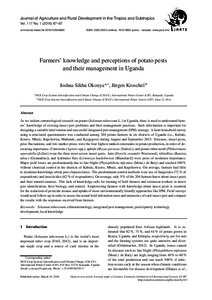Aufsatz

Farmers’ knowledge and perceptions of potato pests and their management in Uganda
Zusammenfassung
As we initiate entomological research on potato (Solanum tuberosum L.) in Uganda, there is need to understand farmers’ knowledge of existing insect pest problems and their management practices. Such information is important for designing a suitable intervention and successful integrated pest management (IPM) strategy. A farm household survey using a structured questionnaire was conducted among 204 potato farmers in six districts of Uganda (i.e., Kabale, Kisoro, Mbale, Kapchorwa, Mubende, and Kyegegwa) during August and September 2013. Diseases, insect pests, price fluctuations, and low market prices were the four highest ranked constraints in potato production, in order of decreasing importance. Cutworms (Agrotis spp.), aphids (Myzus persicae (Sulzer)), and potato tuber moth (Phthorimaea operculella (Zeller)) were the three most severe insect pests. Ants (Dorylis orantalis Westwood), whiteflies (Bemisia tabaci (Gennadius)), and leafminer flies (Liriomyza huidobrensis (Blanchard)) were pests of moderate importance. Major yield losses are predominantly due to late blight (Phytophthora infestans (Mont.) de Bary) and reached 100% without chemical control in the districts of Kabale, Kisoro, Mbale, and Kapchorwa. On average, farmers had little to moderate knowledge about pest characteristics. The predominant control methods were use of fungicides (72% of respondents) and insecticides (62% of respondents). On average, only 5% of the 204 farmers knew about insect pests and their natural enemies. This lack of knowledge calls for training of both farmers and extension workers in insect pest identification, their biology, and control. Empowering farmers with knowledge about insect pests is essential for the reduction of pesticide misuse and uptake of more environmentally friendly approaches like IPM. Field surveys would need follow-up in order to assess the actual field infestation rates and intensities of each insect pest and compare the results with the responses received from farmers.
Zitierform
In: Journal of Agriculture and Rural Development in the Tropics and Subtropics. Kassel : Kassel University Press. - Vol. 117, No. 1 (2016), S. 87-97Sammlung(en)
Vol 117, No 1 (2016) (Journal of Agriculture and Rural Development in the Tropics and Subtropics (JARTS))Zitieren
@article{urn:nbn:de:hebis:34-2016012549800,
author={Okonya, Joshua Sikhu and Kroschel, Jürgen},
title={Farmers’ knowledge and perceptions of potato pests and their management in Uganda},
year={2016}
}
0500 Oax 0501 Text $btxt$2rdacontent 0502 Computermedien $bc$2rdacarrier 1100 2016$n2016 1500 1/eng 2050 ##0##urn:nbn:de:hebis:34-2016012549800 3000 Okonya, Joshua Sikhu 3010 Kroschel, Jürgen 4000 Farmers’ knowledge and perceptions of potato pests and their management in Uganda / Okonya, Joshua Sikhu 4030 4060 Online-Ressource 4085 ##0##=u http://nbn-resolving.de/urn:nbn:de:hebis:34-2016012549800=x R 4204 \$dAufsatz 4170 7136 ##0##urn:nbn:de:hebis:34-2016012549800
<resource xsi:schemaLocation="http://datacite.org/schema/kernel-2.2 http://schema.datacite.org/meta/kernel-2.2/metadata.xsd"> 2016-04-19T08:55:04Z 2016-04-19T08:55:04Z 2016-03-19 1612-9830 2363-6033 urn:nbn:de:hebis:34-2016012549800 http://hdl.handle.net/123456789/2016012549800 eng Kassel University Press Urheberrechtlich geschützt https://rightsstatements.org/page/InC/1.0/ Solanum tuberosum ethnoentomology integrated pest management participatory technology development local knowledge 630 Farmers’ knowledge and perceptions of potato pests and their management in Uganda Aufsatz As we initiate entomological research on potato (Solanum tuberosum L.) in Uganda, there is need to understand farmers’ knowledge of existing insect pest problems and their management practices. Such information is important for designing a suitable intervention and successful integrated pest management (IPM) strategy. A farm household survey using a structured questionnaire was conducted among 204 potato farmers in six districts of Uganda (i.e., Kabale, Kisoro, Mbale, Kapchorwa, Mubende, and Kyegegwa) during August and September 2013. Diseases, insect pests, price fluctuations, and low market prices were the four highest ranked constraints in potato production, in order of decreasing importance. Cutworms (Agrotis spp.), aphids (Myzus persicae (Sulzer)), and potato tuber moth (Phthorimaea operculella (Zeller)) were the three most severe insect pests. Ants (Dorylis orantalis Westwood), whiteflies (Bemisia tabaci (Gennadius)), and leafminer flies (Liriomyza huidobrensis (Blanchard)) were pests of moderate importance. Major yield losses are predominantly due to late blight (Phytophthora infestans (Mont.) de Bary) and reached 100% without chemical control in the districts of Kabale, Kisoro, Mbale, and Kapchorwa. On average, farmers had little to moderate knowledge about pest characteristics. The predominant control methods were use of fungicides (72% of respondents) and insecticides (62% of respondents). On average, only 5% of the 204 farmers knew about insect pests and their natural enemies. This lack of knowledge calls for training of both farmers and extension workers in insect pest identification, their biology, and control. Empowering farmers with knowledge about insect pests is essential for the reduction of pesticide misuse and uptake of more environmentally friendly approaches like IPM. Field surveys would need follow-up in order to assess the actual field infestation rates and intensities of each insect pest and compare the results with the responses received from farmers. open access In: Journal of Agriculture and Rural Development in the Tropics and Subtropics. Kassel : Kassel University Press. - Vol. 117, No. 1 (2016), S. 87-97 Okonya, Joshua Sikhu Kroschel, Jürgen Gedruckte Ausg. im Verlag Kassel Univ. Press (www.upress.uni-kassel.de) erschienen. </resource>
Die folgenden Lizenzbestimmungen sind mit dieser Ressource verbunden:
Urheberrechtlich geschützt

